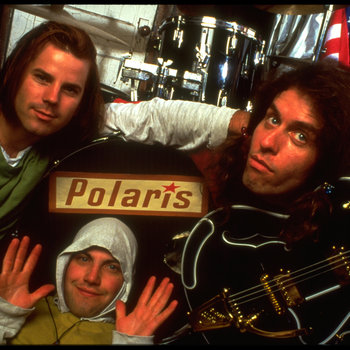
The phrase “your favorite songwriter’s favorite songwriter” often reads like cliché ad copy, but few artists embody the old adage like Mark Mulcahy. The New England native’s discography, spanning 30 years and three distinct projects, remains the fascination of a small, devoted cult fanbase. Yet its influence has left an indelible mark on the landscape of alternative rock. Founded in 1983, his best-known band Miracle Legion was suppressed by label woes and misrepresentative comparisons to R.E.M., which discounted the detailed storytelling and versatility that lurked beneath their collegiate jangle. The understated genius of their four-album discography would outlive the band itself, directly inspiring the likes of Thom Yorke, who cited Miracle Legion’s debut LP Surprise Surprise Surprise as a direct antecedent to OK Computer in a 1997 Time Out interview that also name-dropped Johnny Cash and (surprise, surprise) Michael Stipe. Listen closely and you can detect an overlap between Mulcahy’s mumbly, meditative aesthetic and what Radiohead was recording pre-Pablo Honey.
Though Miracle Legion had a crucial impact on a particular strain of twangy, writerly indie rock, Mulcahy’s short-lived side project Polaris formed in 1993 to supply background music to Nickelodeon’s The Adventures of Pete & Pete, is likely his most beloved contribution to the genre. Originally released in a limited run of 2,100 CDs, the cult surrounding the sitcom’s soundtrack has grown exponentially, spawning five rounds of reissues since its 1999 release and multiple reunion tours.
The majority of Mulcahy’s recorded output in the 21st century has been released under his own name, but the singer-songwriter continues to feed fans of both Miracle Legion and Polaris through Bandcamp, using his trio of pages to release a steady stream of demos, live bootlegs, and rarities. Here’s a guide to the bits of personal lore Mulcahy has made available online, from essential albums to fascinating obscurities.
Miracle Legion (1983-1993)
A Simple Thing


Nearly impossible to track down until its digital reissue in September 2020, Miracle Legion’s 1983 debut EP A Simple Thing offers a glimpse at the band’s original, more austere aspirations. Though about half of this bite-sized demo tape would appear elsewhere in the Connecticut band’s studio canon, tracks like “Stephen Are You There” and future fan favorite “All for the Best” sound radically different played by the initial lineup of Mulcahy, guitarist Ray Neal, bassist Joel Potocsky, and drummer Jeff Wiederschall, any semblance of Miracle Legion’s signature jangle conspicuously absent. These early mixes are awash in a slurry of echo and fuzz that’s more likely to draw comparisons to Hüsker Dü than Peter Buck. Opener “Fight to Fight,” with its gritty drones and pulverizing drum fills, is a neat outlier in Mulcahy’s discography, imbuing his familiar sing-song-y melodies with gut-punching aggression.
Gladder
Gladder is an extension of Miracle Legion’s 1988 compilation Glad, which paired three studio recordings with four excerpts from the band’s final stop on their 1987 tour with Pere Ubu. This 2021 reissue preserves the show in its complete glory, opening with a breathless transition from “Sooner” to “Mr. Mingo” that culminates in an ecstatic blowout of gritty lead guitar and harmonica. Mulcahy brought Ubu on stage for a set-closing performance of “Closer to the Wall” that featured a whopping three drummers.
I Am Einar
Reduced back to a duo after the departure of their rhythm section, Mulcahy and Neal joined The Sugarcubes on their first North American tour in the summer of ‘88. The first half of I Am Einar, recorded at The Metro in Chicago, captures the Legion in an odd metamorphic stage, transposing their college rock scrappiness into the stripped-back folk rock that would appear on their sophomore album Me and Mr. Ray. Their 1984 breakout single “The Backyard” works quite well as a strummy, campfire sing-along in this context, featuring a frenzied rhythm guitar solo and enthusiastic audience participation, and Mulcahy’s colorful harmonica improvisation on “Everyone in Heaven” is truly inspired. Both bands take the stage for a lengthy version of “All for the Best,” in which Mulcahy and Björk harmonize over screeching peals of trumpet—must-listen material. The following year, Miracle Legion and The Sugarcubes would release a collaborative jam, “Johnny’s Dilemma,” on the former’s You’re the One Lee EP, worth grabbing for the baroque remix of the title track on side B.
It’s Almost Christmas
After recruiting bass player Dave McCaffrey and drummer Scott Boutier, Miracle Legion hit the road as a full band once again in 1990 and were stricken with an intense bout of Christmas spirit at the year’s end. It’s Almost Christmas was recorded at The Knitting Factory in New York during a holiday-themed string of December shows, the band playing under the supervision of a light-up Santa Claus. Come for the goofy covers of “Sleigh Ride,” “Little Drummer Boy,” and “White Christmas.” Stay for tight performances by Miracle Legion’s definitive lineup, particularly an explosive “Storyteller.”
Polaris (1993-1996)
Music from the Adventures of Pete & Pete


Would you believe me if I told you that a short-lived sitcom that aired on Nickelodeon contained some of television’s greatest needle drops? The Adventures of Pete & Pete, launched in 1993 by writers Will McRobb and Chris Viscardi, demonstrated indie pop’s flair for recapturing the innocence of adolescence, using songs by shoegazers Drop Nineteens, little-known Flying Nun signees Chug, and UK popkids Fat Tulips to underscore the show’s surreal nostalgic bent. Michael Stipe even made a cameo as a disgruntled ice cream vendor.
Despite these impressive displays of crate digging and name-dropping, it is Pete & Pete’s original soundtrack album—Music from the Adventures of Pete & Pete—that is the show’s most beloved intersection with the world of underground music. The full-length record, used frequently in the backdrop of each of the show’s three seasons, was written entirely by Polaris (essentially Miracle Legion minus Ray Neal) and has amassed a cult following over the past three decades that transcends Pete & Pete itself.
Brisk and shimmering, Music From… is a loose concept album about outer space that intersperses achingly sincere character sketches with collages of Cold War–era broadcasts about cruise missiles and satellites: equal parts fear, awe, and whimsy. The opening theme “Hey Sandy” is an undeniable hit with a killer guitar solo, but nearly every entry in this 12-track disc is worth close consideration. “Waiting for October” is one of the catchiest ruminations on the apocalypse this Prince’s “1999,” “Coronado II” blends its beautiful guitar tone with a clever undercurrent of electric organ, and “Summerbaby” bounces sporadically between spooky dissonance and vocal harmonies. It might have been written for a young audience, but Polaris’s lone release is as good an intro to Mulcahy’s songwriting as you’ll find.
Live at The Orpheum
Nearly 20 years after Pete & Pete first hit small screens, Polaris made its on-stage debut at Los Angeles’s Orpheum Theater, the stage decked out in astroturf and a picket fence to simulate the suburban environs of the show’s opening theme. The band’s sound is a bit stripped-back and loose compared to what you’ve heard on wax, but these alternate versions of Music From… classics make for a fun listen, especially thanks to the addition of guitarist Henning Ohlenbusch and keyboardist Philip Krohnengold, who supplies wild organ riffs on “Recently.”
Snack Bar
Recorded two years later at The Knitting Factory, Polaris sound much more confident and creative on Snack Bar, sneaking a few new originals and Miracle Legion classics into their repertoire. “Great Big Happy Moonface” is the best of the new batch, opening with some Pavement-esque scatting and transitioning into a surprise “Hey Sandy.”
Solo Work
Fathering


After the release of 1992’s Drenched, Miracle Legion spent nearly four years engaged in a legal battle with their label Morgan Creek Entertainment a film production company that made an ill-fated venture into the music industry during the early ’90s. Though Mulcahy would direct his creative efforts toward Polaris and Neal would take a short hiatus from music, the band managed to break free from their contract and produce a final effort in 1996: the aptly named Portrait of a Damaged Family.
Miracle Legion’s swan song marked the beginning of Mulcahy’s own Mezzotint label, which continues to serve as an outlet for the songwriter’s solo and archival material. The following year, he launched his solo career with Fathering, a raw outing that reduced Mulcahy’s trademark sound to its bare essentials while paying homage to his influences. Atop feverishly-strummed electric guitar, he evokes the Beach Boys with rich vocal harmonies on “Jason,” channels Elvis on the bridge of “Bill Jocko,” and breaks out a falsetto on “Ciao My Shining Star,” an echoing ballad in the vein of Phil Spector’s girl group singles. Though not as hooky as Mulcahy’s earlier work, Fathering demonstrates his versatility, exploring timbres beyond Miracle Legion’s distinct jangle.
Poaching and Meddling – Live in Oslo
Recorded at Oslo, Norway’s Bergenfest 2014, Poaching and Meddling is a live performance backed by Massachusetts journeyman Kenneth Maiuri, who hops between keys and drums over the course of the set. The extended version of “Love’s the Only Thing That Shuts Me Up” that appears on this record, heavy on the electric piano, is gut-wrenching.
Petals In the Well
The 2022 compilation Petals in the Well collects songs that Mulcahy was commissioned to write for films that ultimately went unused. The first half of the release, recorded for Mark Pellington’s 2017 film The Last Word, is full of pleasant guitar noodling in the style of Real Estate, with a few wordless dah-dah-dums that recall The Gilmore Girls’ soundtrack. Tracks nine through 15 were composed for Tom Gilroy’s Spring Forward (1999) and concentrate on twangier acoustic tones. “The Future of My Heirs” and “We’ll Always Be Happy” are sparse and elegant, creating a strange atmosphere that’s conversely soothing yet unsettling.







